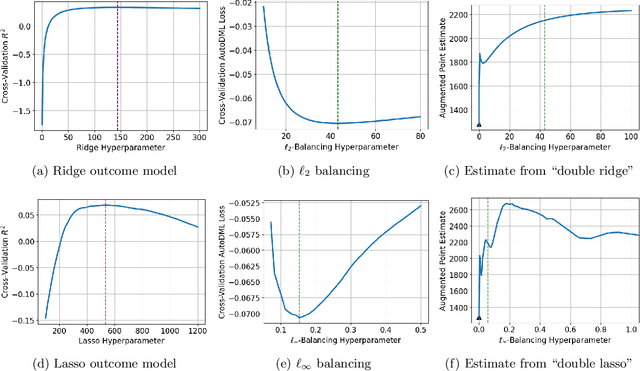David Bruns-Smith
Augmented balancing weights as linear regression
Apr 27, 2023



Abstract:We provide a novel characterization of augmented balancing weights, also known as Automatic Debiased Machine Learning (AutoDML). These estimators combine outcome modeling with balancing weights, which estimate inverse propensity score weights directly. When the outcome and weighting models are both linear in some (possibly infinite) basis, we show that the augmented estimator is equivalent to a single linear model with coefficients that combine the original outcome model coefficients and OLS; in many settings, the augmented estimator collapses to OLS alone. We then extend these results to specific choices of outcome and weighting models. We first show that the combined estimator that uses (kernel) ridge regression for both outcome and weighting models is equivalent to a single, undersmoothed (kernel) ridge regression; this also holds when considering asymptotic rates. When the weighting model is instead lasso regression, we give closed-form expressions for special cases and demonstrate a ``double selection'' property. Finally, we generalize these results to linear estimands via the Riesz representer. Our framework ``opens the black box'' on these increasingly popular estimators and provides important insights into estimation choices for augmented balancing weights.
Robust Fitted-Q-Evaluation and Iteration under Sequentially Exogenous Unobserved Confounders
Feb 01, 2023



Abstract:Offline reinforcement learning is important in domains such as medicine, economics, and e-commerce where online experimentation is costly, dangerous or unethical, and where the true model is unknown. However, most methods assume all covariates used in the behavior policy's action decisions are observed. This untestable assumption may be incorrect. We study robust policy evaluation and policy optimization in the presence of unobserved confounders. We assume the extent of possible unobserved confounding can be bounded by a sensitivity model, and that the unobserved confounders are sequentially exogenous. We propose and analyze an (orthogonalized) robust fitted-Q-iteration that uses closed-form solutions of the robust Bellman operator to derive a loss minimization problem for the robust Q function. Our algorithm enjoys the computational ease of fitted-Q-iteration and statistical improvements (reduced dependence on quantile estimation error) from orthogonalization. We provide sample complexity bounds, insights, and show effectiveness in simulations.
Model-Free and Model-Based Policy Evaluation when Causality is Uncertain
Apr 02, 2022



Abstract:When decision-makers can directly intervene, policy evaluation algorithms give valid causal estimates. In off-policy evaluation (OPE), there may exist unobserved variables that both impact the dynamics and are used by the unknown behavior policy. These "confounders" will introduce spurious correlations and naive estimates for a new policy will be biased. We develop worst-case bounds to assess sensitivity to these unobserved confounders in finite horizons when confounders are drawn iid each period. We demonstrate that a model-based approach with robust MDPs gives sharper lower bounds by exploiting domain knowledge about the dynamics. Finally, we show that when unobserved confounders are persistent over time, OPE is far more difficult and existing techniques produce extremely conservative bounds.
Outcome Assumptions and Duality Theory for Balancing Weights
Mar 17, 2022

Abstract:We study balancing weight estimators, which reweight outcomes from a source population to estimate missing outcomes in a target population. These estimators minimize the worst-case error by making an assumption about the outcome model. In this paper, we show that this outcome assumption has two immediate implications. First, we can replace the minimax optimization problem for balancing weights with a simple convex loss over the assumed outcome function class. Second, we can replace the commonly-made overlap assumption with a more appropriate quantitative measure, the minimum worst-case bias. Finally, we show conditions under which the weights remain robust when our assumptions on the outcomes are wrong.
 Add to Chrome
Add to Chrome Add to Firefox
Add to Firefox Add to Edge
Add to Edge